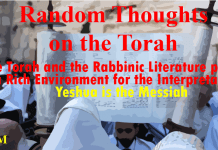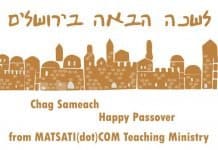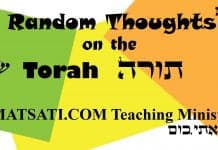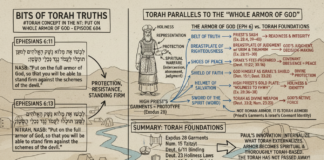Did you know Chassidic Judaism teaches of a mystical internalization and personalization of a relationship with God through an intermediary? Does this sound familiar? The interesting thing is this principle may be illustrated in Christianity. Take for example, have you heard the Christian cliche “do you have a personal relationship with Jesus Christ?” Thinking about this statement, obviously the answer is NO in the sense that we do not know him personally, and neither did the Apostle Paul, we are never told in the Scriptures whether Paul had actually met Yeshua outside of the Damascus road experience. On the other hand, the mystical answer to that question is YES! This is not just a theological platitude. According to the Scriptures, having faith in Yeshua (Jesus), the believer is said to know him and is known by him. He is bound to Yeshua, and Yeshua is bound to the believer. The believer must live to him, and he (Yeshua) lives through the believer. This idea of being bound up with the Messiah so that the Messiah lives through us has parallels in Jewish mysticism. The idea of the Christian cliche of having a personal relationship with the Messiah are similar to expressions of Jewish mysticism.
Consider the following video:
Chassidic Judaism teaches the same kind of mystical internalization and personalization of a relationship with God by connecting this through one’s relationship with his rebbe, the tzaddik. Consider the Chassidic prayer upon entering the Synagogue:
“I hereby attach myself through my Torah study to all the true Tzaddikim of our generation, and to all the true Tzaddikim who “dwell in the dust”—the holy ones who are in the earth. And specifically to the true and holy Tzaddik, the Tzaddik who is the “foundation of the world,’ “a flowing brook, a wellspring of wisdom,” and joy and faith, Rebbe Nachman, the son of Simcha and Feiga. May his merit protect us and all the Jewish people. Amen.” (https://www.shuvubonim.org/hisk.html )
The idea here is very similar to the teachings we find in the Apostolic Writings. From the perspective of the chasid, they have their rebbe in their heart as illustrated in the prayer declaration “I hereby attach myself to the soul of and in the merit of Rebbe Nachman.” This is exactly what is being taught by the disciples when one places his faith in Yeshua, the believer is said to know him and is known by him. By this proclamation of faith, the believer is bound to Yeshua, and Yeshua is bound to the believer. The believer must live to him, and he lives in and through the believer.
Consider what we are being taught in 1 John 5:1-21
1 John 5:1-215:1 Whoever believes that Jesus is the Christ is born of God, and whoever loves the Father loves the child born of Him. 5:2 By this we know that we love the children of God, when we love God and observe His commandments. 5:3 For this is the love of God, that we keep His commandments; and His commandments are not burdensome. 5:4 For whatever is born of God overcomes the world; and this is the victory that has overcome the world our faith. 5:5 Who is the one who overcomes the world, but he who believes that Jesus is the Son of God? 5:6 This is the One who came by water and blood, Jesus Christ; not with the water only, but with the water and with the blood. It is the Spirit who testifies, because the Spirit is the truth. 5:7 For there are three that testify: 5:8 the Spirit and the water and the blood; and the three are in agreement. 5:9 If we receive the testimony of men, the testimony of God is greater; for the testimony of God is this, that He has testified concerning His Son. 5:10 The one who believes in the Son of God has the testimony in himself; the one who does not believe God has made Him a liar, because he has not believed in the testimony that God has given concerning His Son. 5:11 And the testimony is this, that God has given us eternal life, and this life is in His Son. 5:12 He who has the Son has the life; he who does not have the Son of God does not have the life. 5:13 These things I have written to you who believe in the name of the Son of God, so that you may know that you have eternal life. 5:14 This is the confidence which we have before Him, that, if we ask anything according to His will, He hears us. 5:15 And if we know that He hears us in whatever we ask, we know that we have the requests which we have asked from Him. 5:16 If anyone sees his brother committing a sin not leading to death, he shall ask and God will for him give life to those who commit sin not leading to death. There is a sin leading to death; I do not say that he should make request for this. 5:17 All unrighteousness is sin, and there is a sin not leading to death. 5:18 We know that no one who is born of God sins; but He who was born of God keeps him, and the evil one does not touch him. 5:19 We know that we are of God, and that the whole world lies in the power of the evil one. 5:20 And we know that the Son of God has come, and has given us understanding so that we may know Him who is true; and we are in Him who is true, in His Son Jesus Christ. This is the true God and eternal life. 5:21 Little children, guard yourselves from idols. (NASB)
What John is teaching here is the mystical aspect of being in the Messiah, that whoever believes in Him is born of God. He says we demonstrate our love for God if we obey God’s mitzvot (His commandments). Believing in the Name of the Messiah, Praying in His Name, we can be assured that God hears our prayers. John couples the concept of sin and righteousness to the idea of remaining in the Messiah, and being born of God to those who overcome the world. It is in and through the Messiah Yeshua that we are given understanding in knowing God and also to having eternal life.
What we are learning in this article is the life of faithfulness should be one of focusing upon this inwardness. Our every thought and action should be measured against this mystical attitude towards the Messiah, just as is taught in Chassidic Judaism about their rebbe. Our faith in the Messiah Yeshua applies to every thought, choice, and decision in life both big and small, from entertainment to employment and to the one whom we choose as a spouse. We are to rise up in the morning with this on our minds, and we lay down to bed again in the same way. We no longer live to ourselves, but to Christ and Christ lives in and through us! This is what the Scriptures (the Bible) are teaching us and what the life of a believer is all about. Note, we who believe the NT do not believe Rabbi Nachman died paying the price for our sins. We believe Yeshua HaMoshiach (Jesus the Messiah) did this according to the NT Scriptures. The end result of believing in Yeshua is of knowing the Messiah and the power of His resurrection, so that we might share in his sufferings, becoming like him in his death, and that by any means possible we may attain to the resurrection of the dead. Not that we have already attained this, or are already made perfect, but that we press on to put God’s word into action, to make it our own because our Master has made us His own! (see Philippians 3) It is in this way in which we live in the Messiah and the Messiah lives in and through us! This is what it means to have in Yeshua the Messiah and to keep him in our hearts!
An interesting observation, based upon this discussion, while studying the NT it is easy to find applications like this that have their parallel in Judaism!









